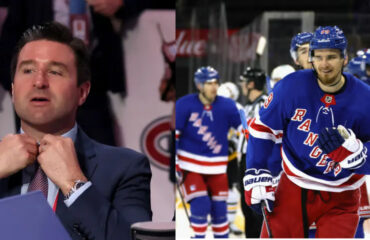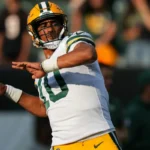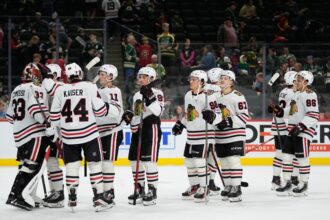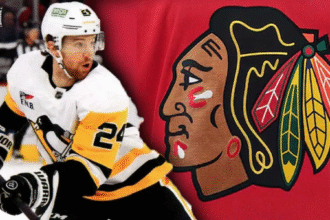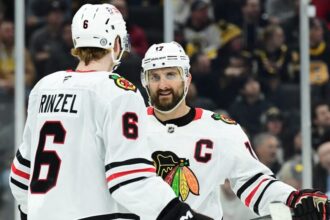Chris Drury took over as general manager of the New York Rangers in the summer of 2021. Despite two Eastern Conference Final appearances and a franchise-best Presidents’ Trophy season in 2023-24, the Blueshirts have not yet achieved the ultimate goal of winning the Stanley Cup.
They haven’t reached the Cup Final since 2014, with their last Stanley Cup title being 30 years ago in 1994. While these events occurred before Drury’s tenure, he has built competitive and successful rosters but also made critical mistakes that have hindered New York from reaching their peak.
As we are in the midst of arguably his most important offseason to date, let’s examine his worst moves as the Rangers’ general manager. This evaluation will exclude the current offseason transactions, as it’s too early to judge them, but will consider all other moves since he took charge in June 2021.
Worst moves by Chris Drury as Rangers GM

5. Acquiring Patrick Kane before 2023 trade deadline
Acquiring Patrick Kane was a dream come true for many Rangers fans and seemed like a no-brainer when the team brought him in ahead of the 2023 NHL trade deadline. With the future Hall of Famer essentially forcing his way to New York, the cost of a second and fourth-round pick made the deal even more appealing.
However, Kane’s performance in the regular season was underwhelming, with just five goals and 12 points in 19 games. While he isn’t solely to blame for the Rangers’ first-round playoff exit to the New Jersey Devils, where he scored a goal and six points in the seven-game series, his addition complicated matters. A hip injury that required offseason surgery greatly limited Kane’s effectiveness. Despite his big name, a visibly hampered Kane didn’t significantly enhance the Rangers’ status as a Stanley Cup contender.
Drury had already acquired talented veteran winger Vladimir Tarasenko, making Kane less of a necessity and more of a luxury. The result was a disjointed forward group that never truly found its footing, perhaps exemplifying the expression “too many chefs in the kitchen.” Although Kane isn’t responsible for the disappointing first-round exit, in hindsight, Drury should have avoided acquiring the injured superstar.
4. Signing Barclay Goodrow in 2021 offseason

One of Drury’s first moves as Rangers GM was signing Barclay Goodrow to a six-year, $3.64 million AAV contract. Fresh off helping the Tampa Bay Lightning to consecutive Stanley Cup championships in 2020 and 2021 as part of a dynamic third line with Yanni Gourde and Blake Coleman, Goodrow was a desirable target league-wide. However, Drury overpaid for his championship pedigree and veteran leadership, giving a hefty contract with a long term to a bottom-six role player.
Goodrow mainly played on the fourth line as the center of New York’s top checking line. Despite getting top penalty kill minutes, Goodrow’s average time on ice (ATOI) dipped from 16:43 in his first season to 12:34 in 2024. After back-to-back 10-plus goal, 30-plus point seasons with New York, his production dropped significantly in 2024, scoring just four goals and finishing with 12 points in 80 games, while recording a minus-13 rating. He proved to be a valuable asset in the postseason, scoring six goals in the run to the Eastern Conference Final, but it wasn’t enough to get the Rangers to the Cup in any of his three seasons.
Goodrow’s impact on the penalty kill and postseason shouldn’t be overlooked, but it’s overshadowed by his AAV, which was simply too high for someone who only played a bottom-six role. The fact that Drury put him on waivers after his strong postseason is a telling indictment of the contract, and the GM was fortunate the San Jose Sharks claimed him and the final three years of that deal.
3. Trading for Jack Roslovic before 2024 deadline

Drury’s first trade deadline was a resounding success, but the following two have left something to be desired. After failing via the superstar route in 2023, Drury opted for a quieter trade deadline in 2024, acquiring Alex Wennberg, Nic Petan, Chad Ruhwedel, and Jack Roslovic. While Wennberg was a solid move to bolster depth down the middle, Roslovic was not the solution the Rangers needed at wing.
Despite a strong record and a lead in the Metropolitan Division, the Rangers faced a familiar issue with Mika Zibanejad and Chris Kreider struggling to mesh at even strength with a rotating cast of right wingers, including Kaapo Kakko, Blake Wheeler, and Jimmy Vesey.
Plenty of talented wingers were available at the deadline. Pittsburgh Penguins star Jake Guentzel headlined when he was shipped to the Carolina Hurricanes, and other enticing names like Tyler Toffoli, Anthony Mantha, and Anthony Duclair were also available. The Rangers, however, acquired the enigmatic Roslovic, who’d scored more than 12 goals only once in his career, right before the deadline from the Columbus Blue Jackets.
The speedy winger managed just three goals and eight points in 19 regular-season games after the trade, all on the top line. After a hot start to his postseason, recording a point in each of his first five games, Roslovic’s production completely cratered. By the Eastern Conference Final, he was relegated to a fourth-line role.
Like Kane, Roslovic is probably not the reason the Rangers fell in the postseason, but perhaps a stronger offensive winger could’ve helped turn the tide in their favor. Drury only gave up a fourth-round pick for Roslovic, so the deal itself isn’t a disaster, but missing on a top-six addition hurts when a Stanley Cup title is within reach.
Roslovic is already out the door, having signed a one-year contract with the Hurricanes this summer.
2. Signing Patrik Nemeth in 2021 offseason

Another move from his first offseason, Drury signed Patrik Nemeth to a three-year, $2.5 million AAV deal with hopes he could be a reliable bottom-pairing defenseman.
Nemeth was 29 at the time and coming off a solid season splitting time with the Detroit Red Wings and Colorado Avalanche, posting 10 points and a plus-5 rating. However, Nemeth’s performance took a deep dive as soon as he donned the Rangers uniform.
He recorded seven points and had a minus-9 rating through 63 games, grading out in the bottom one percent of all skaters in Evolving Hockey’s player charts. With two years and $5 million still left on his contract, Drury attached a pair of second-round picks just to send him to the Arizona Coyotes and get his money off the books.
Nemeth’s lone season in New York was a disaster, and the collateral of two second-round picks just to offload him makes this signing a complete failure.
1. Trading Pavel Buchnevich in 2021 offseason

The most maligned move of Drury’s tenure is undoubtedly trading Pavel Buchnevich in the summer of 2021.
Buchnevich was due for a significant raise as a restricted free agent, and the Rangers were tight against the salary cap. To avoid a bigger payday for the then 25-year-old winger, Drury traded him to the St. Louis Blues for Sammy Blais and a second-round pick.
Blais had a tough stint with the Rangers, suffering a brutal knee injury, failing to score a goal, and recording just nine points in 54 games before being shipped back to St. Louis in the Tarasenko trade in 2023. The second-round pick was flipped to the Winnipeg Jets for Andrew Copp, who was a useful short-term addition after the 2022 deadline, but this left the Rangers with no remnants from the Buchnevich trade.
Adding to the sting, Buchnevich has thrived since leaving New York. After scoring 20 goals and 48 points in his last season with the Rangers, he immediately stepped up as an elite winger, netting a career-high 30 goals and 78 points in his first season with the Blues. He has maintained this level of production, posting 60-plus points and 25-plus goals in each of his first three seasons in St. Louis.
Despite Rangers fans longing for a reunion, Buchnevich won’t be returning after signing a six-year, $8 million AAV extension to stay with the Blues long-term. Meanwhile, the Rangers have struggled to fill the void at right wing that his departure left. Frank Vatrano’s half-season in 2022 provided some hope, but he couldn’t replicate the chemistry and production that Kreider, Zibanejad, and Buchnevich had developed.
This offseason’s trade for Reilly Smith is the latest attempt to fill a gap that has lingered ever since Buchnevich’s departure. Drury has made his share of missteps, but none quite compare to this.
